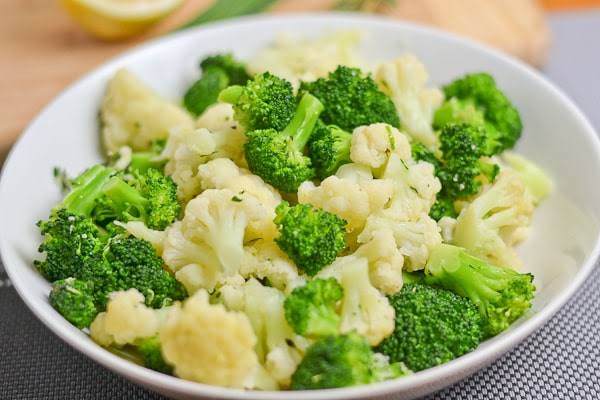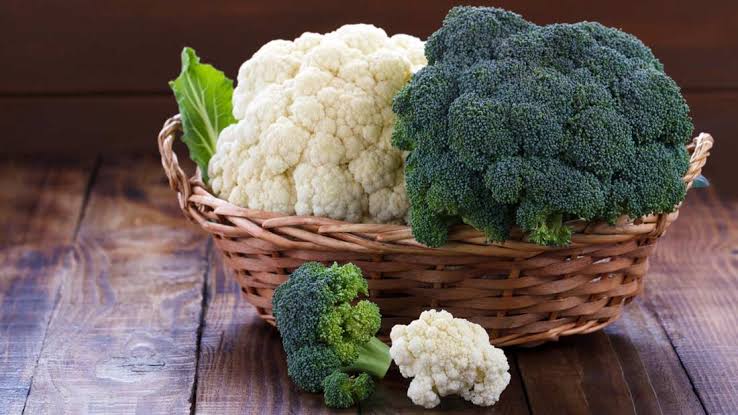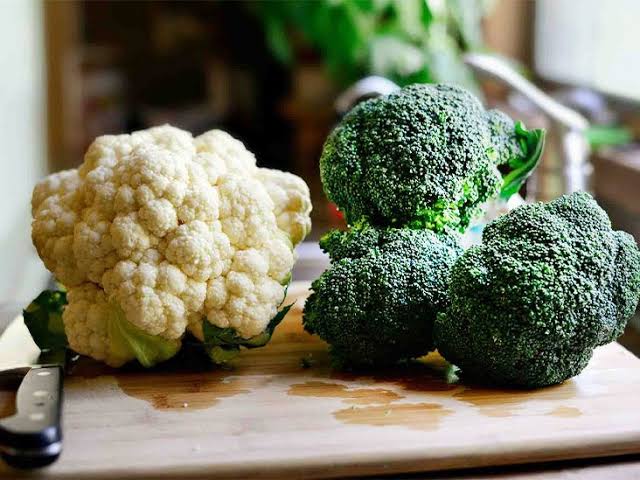Broccoli and cauliflower are two vegetables that offer numerous health benefits, these green and white veggies are not only tasty but also packed with essential nutrients that contribute to overall well-being.
Starting with broccoli, this cruciferous vegetable is a rich source of vitamin C, which is vital for a strong immune system. It also contains fiber, aiding in digestion and promoting a healthy gut. Moreover, broccoli is known for its anti-inflammatory properties, potentially reducing the risk of chronic diseases.
Moving on to cauliflower, it, too, is a nutritional powerhouse. Cauliflower is low in calories but high in nutrients, making it an excellent choice for those watching their weight. Like broccoli, cauliflower is a great source of vitamin C, supporting skin health and providing antioxidant benefits.
Both vegetables contain sulforaphane, a compound believed to have cancer-fighting properties. Research suggests that regularly consuming broccoli and cauliflower may contribute to a lower risk of certain cancers, making them valuable additions to a balanced diet.
Furthermore, these vegetables are rich in folate, a B-vitamin important for cell division and growth. Folate is especially crucial for pregnant women as it helps prevent neural tube defects in developing fetuses.
Broccoli and cauliflower also offer a good dose of vitamin K, promoting healthy blood clotting and bone health. This makes them beneficial for individuals aiming to maintain strong and resilient bones as they age.
Including broccoli and cauliflower in your diet can provide a wide array of health benefits, ranging from immune system support and anti-inflammatory effects to cancer prevention and bone health. Their simplicity in preparation and versatility in recipes make these vegetables easy to incorporate into various meals, ensuring you reap the rewards of their nutritional goodness.
Read Also: Horned Melons (Kiwano): History, Nutrition, Health Benefits and Growing Guide
What are the Health Benefits of Broccoli and Cauliflower?

Broccoli and cauliflower boast numerous health benefits:
1. Rich in Nutrients: Both vegetables are packed with essential nutrients, including vitamins C and K, folate, and fiber, contributing to overall well-being.
2. Immune System Support: The high vitamin C content in broccoli and cauliflower promotes a strong immune system, helping the body defend against illnesses.
3. Digestive Health: The fiber in these vegetables aids in digestion, supporting a healthy gut and regular bowel movements.
4. Anti-Inflammatory Properties: Broccoli and cauliflower contain compounds with anti-inflammatory effects, potentially reducing the risk of chronic diseases.
5. Cancer Prevention: Sulforaphane, found in both vegetables, is associated with cancer-fighting properties, suggesting a potential role in preventing certain types of cancer.
6. Weight Management: Cauliflower, in particular, is low in calories but rich in nutrients, making it a suitable choice for those aiming to manage their weight.
7. Skin Health: The presence of vitamin C contributes to healthy skin by promoting collagen production and protecting against oxidative stress.
8. Bone Health: Both vegetables provide vitamin K, which is essential for maintaining strong and healthy bones, as well as supporting proper blood clotting.
9. Heart Health: The combination of fiber, antioxidants, and other nutrients in broccoli and cauliflower may contribute to heart health by reducing cholesterol levels and supporting overall cardiovascular function.
10. Folate for Pregnancy: The folate content in these vegetables is crucial, especially for pregnant women, as it helps prevent neural tube defects in developing fetuses.
Incorporating broccoli and cauliflower into your diet can be a delicious and nutritious way to enhance your overall health and well-being.
Read Also: Feijoas: History, Nutrition, Health Benefits and Growing Guide
Nutritional Values of Broccoli and Cauliflower

Here are the approximate nutritional values for 100 grams of raw broccoli and cauliflower:
1. Broccoli:
Calories: 55
Water: 89%
Protein: 3.7g
Carbohydrates: 11.2g
Dietary Fiber: 2.6g
Sugars: 1.7g
Fat: 0.6g
Vitamin C: 89.2mg
Vitamin K: 101.6µg
Folate: 63µg
Calcium: 47mg
Iron: 0.7mg
Magnesium: 21mg
Phosphorus: 66mg
Potassium: 316mg
2. Cauliflower:
Calories: 25
Water: 92%
Protein: 1.9g
Carbohydrates: 5.3g
Dietary Fiber: 2g
Sugars: 1.9g
Fat: 0.3g
Vitamin C: 48.2mg
Vitamin K: 15.5µg
Folate: 57µg
Calcium: 22mg
Iron: 0.4mg
Magnesium: 15mg
Phosphorus: 44mg
Potassium: 299mg
These values are based on general nutritional data and may vary depending on factors like cooking methods. Including both broccoli and cauliflower in your diet ensures a diverse range of nutrients that contribute to overall health.
How to Care for Broccoli and Cauliflower

Caring for broccoli and cauliflower involves attention to planting, watering, fertilizing, and pest control. Here’s a simple guide:
1. Planting:
Location: Choose a well-drained area with full sunlight. Broccoli and cauliflower thrive in cool weather, so plan your planting season accordingly.
Soil: Use nutrient-rich, well-draining soil. Amend the soil with compost to ensure adequate fertility.
Spacing: Plant seeds or seedlings with proper spacing to allow for air circulation, which helps prevent diseases.
2. Watering:
Consistent Moisture: Keep the soil consistently moist. Water deeply to encourage strong root development.
Avoid Waterlogging: Ensure proper drainage to prevent waterlogging, as both vegetables are susceptible to root diseases.
3. Fertilizing:
Balanced Fertilizer: Use a balanced fertilizer or compost when planting. Side-dress with additional fertilizer during the growing season.
Nitrogen Levels: Broccoli benefits from higher nitrogen levels early on, while cauliflower prefers a more balanced nutrient approach throughout its growth.
4. Pest Control:
Inspect Regularly: Check plants regularly for pests such as aphids, cabbage worms, and slugs.
Natural Predators: Encourage natural predators like ladybugs and parasitic wasps to control pest populations.
Organic Remedies: Consider using organic remedies like neem oil or insecticidal soap to deter pests.
5. Harvesting:
Timing: Harvest broccoli when the central head is fully developed but before it starts to flower. Cauliflower should be harvested when the head is firm and compact.
Cutting Technique: Use a sharp knife to cut the main head, leaving some leaves attached to protect the smaller side shoots that may develop.
6. Post-Harvest Care:
Storage: Store harvested broccoli and cauliflower in the refrigerator to maintain freshness.
Utilize Leaves and Stalks: Don’t discard the leaves and stalks; they are edible and nutritious. You can use them in various recipes.
By providing proper care, you can enjoy a bountiful harvest of fresh and healthy broccoli and cauliflower from your garden.
Uses of Broccoli and Cauliflower
1. Broccoli:
Steamed or Boiled: Enjoy broccoli as a simple and nutritious side dish by steaming or boiling it. Add a touch of lemon juice or olive oil for extra flavor.
Stir-Fry: Include broccoli in stir-fries for a quick and tasty dish. Combine it with other vegetables, protein sources, and your favorite sauces.
Raw in Salads: Chop broccoli into bite-sized pieces and add it to salads for a crunchy texture and added nutritional value.
Soup: Blend cooked broccoli into a creamy soup for a comforting and nutrient-rich meal.
Roasted: Roast broccoli with olive oil and your favorite spices for a flavorful and slightly crispy side dish.
Grilled: Grill broccoli to enhance its natural flavors. Drizzle with balsamic glaze or sprinkle with Parmesan cheese for added taste.
2. Cauliflower:
Cauliflower Rice: Grate or process cauliflower to create a low-carb alternative to rice. Use it in various recipes as a healthy base.
Mashed Cauliflower: Boil and mash cauliflower as a nutritious substitute for mashed potatoes. Add garlic, butter, or herbs for extra flavor.
Roasted Cauliflower: Toss cauliflower florets with olive oil and your favorite spices, then roast them for a tasty and crispy snack or side dish.
Cauliflower Pizza Crust: Make a gluten-free pizza crust using cauliflower, providing a lighter and veggie-packed alternative.
Buffalo Cauliflower Bites: Coat cauliflower florets in buffalo sauce and bake them for a flavorful and healthier version of buffalo wings.
Cauliflower Soup: Blend cooked cauliflower into a creamy soup, similar to broccoli soup, for a warming and nutritious meal.
Both broccoli and cauliflower are versatile vegetables that can be incorporated into a variety of dishes, offering a delicious way to enjoy their health benefits.
Read Also: A Guide to Waste Management Case Studies

